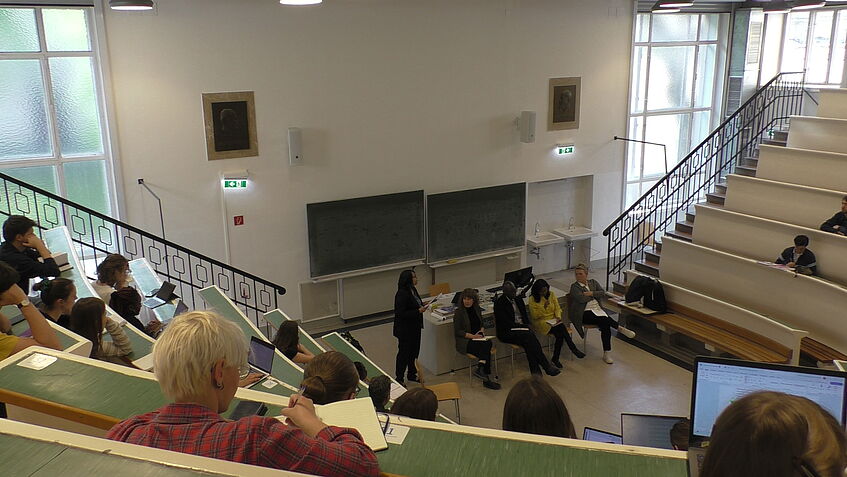Youth activism and Fridays for Future. An intersectional and global perspective
The climate crisis is one of the overarching global crises of our time. Since 2019, youth are at the forefront of addressing the climate crisis and are able to mobilize masses for climate justice. Fridays for Future is just one example of climate justice movements. With Fridays for Future, a new form of youth activism emerged, unique in its global scope and the low average age of the activists. Such climate justice movements have become the major civil society players in global environmental politics and in many national contexts. Their collective actions for climate justice show that aspiring to an ecologically and socially just future has become a central field of conflict in contemporary societies, shaping political and public debates.
It is the fifth year of mobilization of these climate justice movements, and yet there is hardly any research on the global dimension of this form of youth activism. With case studies on Austria, Bangladesh and Uganda, the project aims to fill this gap by analysing the relevance and resonance of local conditions in youth activism, and to explore similarities and differences between youth activism globally. Our research is guided by the following questions: Who are the young people engaged in the climate justice movements? What motives drive activists, given the fact that the climate crisis in the Global South is not only a natural crisis, but is also linked to food shortages, the spread of diseases, health problems, increasing inequalities, migration or social conflicts? What understanding of politics and political demands do young people have? In order to understand the multiple motives of the protesters, we apply an intersectional lens, unpacking to what extent age, gender, race or religion shape motives, demands and activism. Because little is known about climate justice movements in the Global South, we provide an understanding of the diversity of the global crises and the multiplicity of collective actions. There has also been little intersectional research exploring which young people are represented in collective actions and which remain unheard. Therefore, this research project is a synthesis of youth and social movement studies, combined with intersectionality and a comparative case study design. It offers an original analytical framework for the investigation of neglected youth activism in the Global South in the context of global struggles. This research projekt will provide in-depth knowledge of context-specific differences between collective action in Austria, Bangladesh and Uganda, and commonalities in global youth activism and advocacy for ecological transformation.
Project leader: Prof. Dr. Daniel, Department of Development Studies, University of Vienna
Co-project leader: Prof. Dr. Dannecker, Department of Development Studies, University of Vienna
Cooperation partner: Prof. Dr. Naher, Jahangirnagar University and Prof. Dr. Esuruku, Makarere Unviversity
Funded by: Austrian Science Fond (FWF) 2023-2026
News and Publications
Klimaprotest: international, wütend, entschlossen In: scilog – das Wissenschaftsmagazin des FWF, October 2025
Kick-off workshop 11th to 12th of April 2024

© Michaela Hochmuth
Kick-off workshop 11th to 12th of April 2024
In order to launch the project "Youth Activism and Fridays For Future. An intersectional and global perspective" (funded by the Austrian Science Fund), a kick-off workshop was organised on 11-12 April 2024. Against the backdrop of the 2019 wave of environmental youth movements inspired by Greta Thunberg (Fridays For Future movement), it is evident that youth engagement has not received in-depth academic attention, neither in the field of youth studies nor in social movement studies, and especially not with regard to youth engagement in the Global South. This project aims to fill this knowledge gap by conducting a comparative study of environmental youth activism in Austria, Uganda and Bangladesh, focusing on environmental activists in the Global South. The project will be carried out in partnership between the University of Vienna (Austria), Makerere University (Uganda) and Jahangirnagar University (Bangladesh).
After months of extensive desk research by the project team to gain in-depth knowledge of the contexts, especially the different actors in the different settings, a kick-off workshop was organised to launch the project. The workshop served as a platform to communicate the project's objectives to the general public. To this end, a panel discussion on "Environmental Activism from a Global Perspective" was organised on Thursday 11 April as part of the Department of Development Studies' public lecture series, the ie.talks. Moderated by Fahima Al Farabi, the panelists Prof. Dr. Esuruku from Makerere University (Uganda), Prof. Dr. Naher from Jahangirnagar University (Bangladesh), Dr. Antje Daniel and Prof. Dr. Petra Dannecker (both University of Vienna, Austria) discussed questions of environmental activism from a global perspective. Students, staff and interested members of the public attended the event. The panel discussion and the two-day workshop were a great success, especially the latter, which provided a space and platform for the team and project coordinators to meet, share and plan the next steps together. The project team is currently preparing for their first field trips to Uganda and Bangladesh.
